When I got my first 1911 about a dozen years ago (could it be that long ago? Dammit, age has snuck up on me), it was a pretty much bone stock gun. My Springfield Armory 1911-A1 Lightweight started out as a modified GI gun. It came from the factory with the lowered ejection port and high visibility sights, but everything else was GI style. Upon first shooting that gun, I found out GI style grip safeties chew holes in my hands.
Clearly, I needed some help, but I don't know any gunsmiths personally. I needed a way to choose one. My "rule number one" of gun modifications is that nobody works on my gun unless they're the best available. Guns are expensive investments, so letting Bubba attack your piece with a belt sander is a poor course of action. On top of that, if you have to use that weapon in a defensive situation, you'd be better served by being able to show that the modifications were done by a professional, rather than hacked by some Michigan Militia type.
Few people would intelligently argue against my rule number one. Some might argue against some of the others, such as "always have a bottle opener", but not R1. But that leads us again to "who do I take my gun to for pro work?" Now I can hook you up with the same method I used to find Lance Martini, who did such an awesome job on my 1911: The American Handgunner Club 100 . This is the list of the 100 best gunsmiths in the US. Talk about an amazing resource. I doubt I'd be as thrilled with my 1911 as I am, even after all this time.
Friday, October 06, 2006
Subscribe to:
Post Comments (Atom)




No comments:
Post a Comment